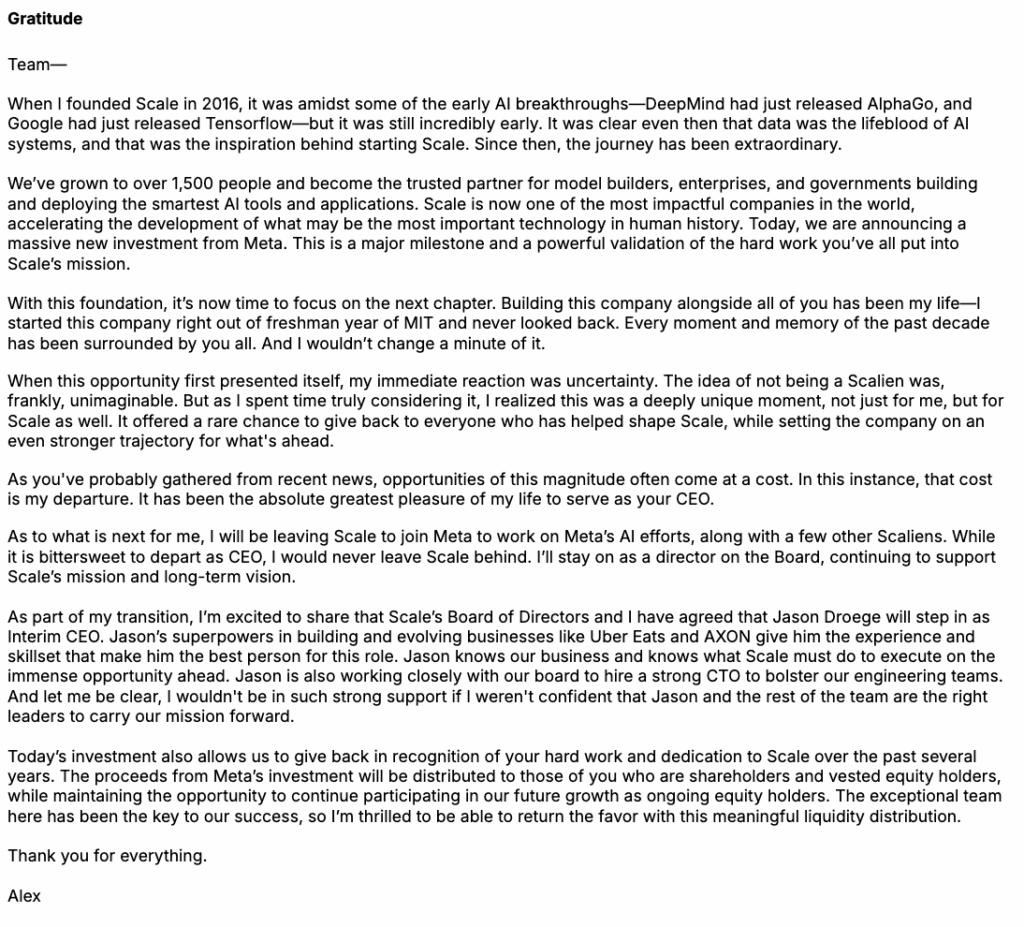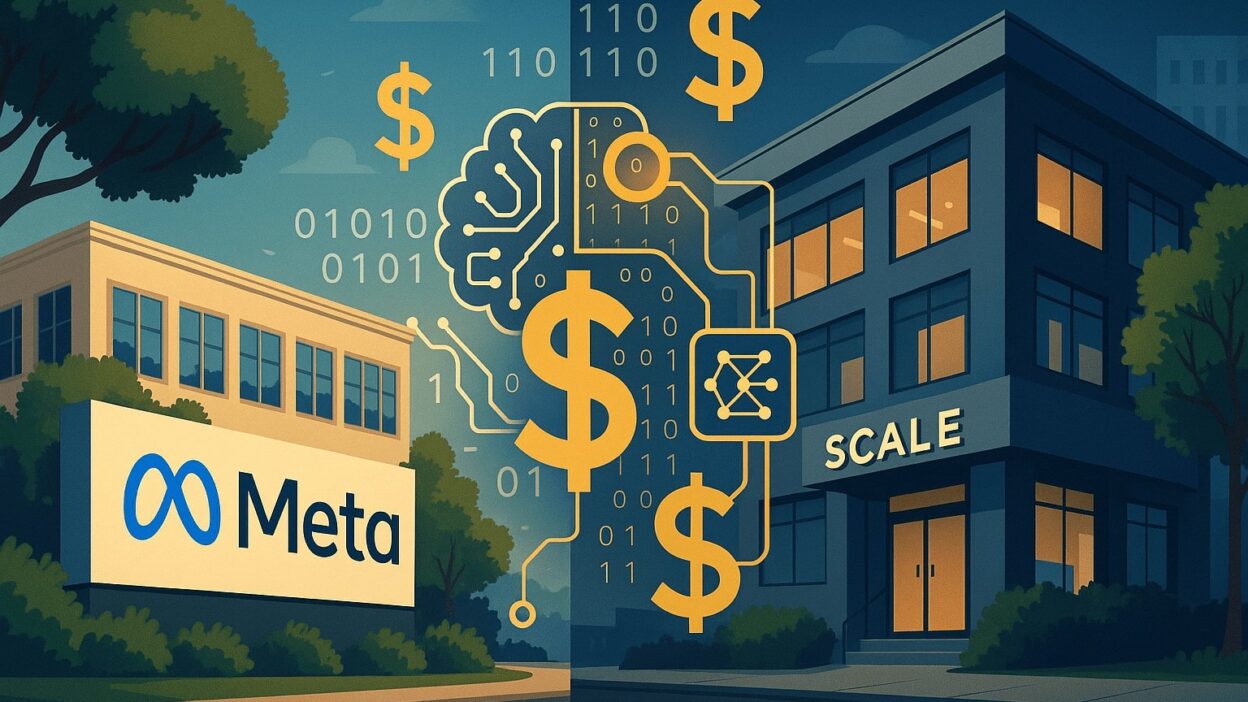Meta, the company that owns Facebook and Instagram, just made a huge bet on artificial intelligence. The tech giant is paying $14.3 billion to buy nearly half of Scale AI, a data company that helps train AI systems. The deal brings Scale AI’s 28-year-old founder, Alexandr Wang, to Meta to lead their fight against competitors like OpenAI and Google. This marks Meta’s second-biggest purchase ever, showing how serious CEO Mark Zuckerberg is about winning the AI race.

Meta Makes Historic Investment to Catch Up in AI Race
Meta’s massive investment in Scale AI shows the company’s urgent need to compete with rivals in artificial intelligence. The $14.3 billion deal gives Meta a 49% stake in Scale AI, making it the second-largest acquisition in Meta’s history. Only the $19 billion WhatsApp purchase in 2014 was bigger.
Scale AI helps tech companies prepare data to train their AI models. This data preparation is crucial for building smart AI systems like ChatGPT or Google’s Bard. Major companies including OpenAI, Microsoft, and Google already use Scale AI’s services. The startup was worth $14 billion just last year, but this new deal doubles its value to $29 billion.
Mark Zuckerberg has been frustrated with Meta’s progress in AI compared to competitors. Sources say he grew upset when Meta’s latest Llama 4 AI models received poor reviews from developers earlier this year. Meanwhile, rivals like OpenAI continue to grab headlines with impressive new AI tools.
The deal structure is unusual because Meta won’t get voting control despite its huge investment. Scale AI will remain independent while Meta gains access to its data expertise and top talent. This arrangement helps both companies – Meta gets AI help while Scale AI gets massive funding to grow.
Young Genius Leaves His Company to Join Meta’s AI Push
Alexandr Wang’s move from Scale AI to Meta represents a major victory for Zuckerberg in the talent war for top AI minds. Wang dropped out of MIT at age 19 to start Scale AI in 2016 with co-founder Lucy Guo. He quickly became one of Silicon Valley’s most promising young entrepreneurs.

Wang was born in Los Alamos, New Mexico, to Chinese immigrant parents who worked as physicists. His early interest in technology led him to the prestigious Massachusetts Institute of Technology. However, he left school to pursue his business idea after recognizing the huge need for quality data in AI development.
Under Wang’s leadership, Scale AI grew from a small startup to a billion-dollar company serving hundreds of customers. The company employs more than 1,500 people and recently signed major contracts with the U.S. Department of Defense. Wang’s success made him a billionaire before turning 30.
At Meta, Wang will lead a new “superintelligence” team focused on developing advanced AI systems. This represents Zuckerberg’s bet that Wang’s business skills and technical knowledge can help Meta compete better against OpenAI and other rivals. Few details about Wang’s specific role have been revealed, but Meta promises to share more information in coming weeks.
Jason Droege, Scale AI’s current strategy chief, will take over as CEO. Wang will stay on Scale AI’s board as a director to help guide the company’s future direction.
Scale AI’s Data Labeling Business Powers Modern AI
Scale AI built its success by solving one of AI’s biggest challenges – preparing massive amounts of data for training smart computer systems. The company employs over 100,000 workers worldwide who label and organize data that teaches AI models how to recognize images, understand text, and make decisions.
This data labeling work is essential for training AI systems. For example, to teach a self-driving car to recognize stop signs, human workers must first label thousands of stop sign images. Scale AI manages this complex process for companies that don’t want to handle it themselves.
The company started by focusing on autonomous vehicles, helping companies like Tesla and Toyota prepare driving data. Scale AI workers would label every car, person, and traffic sign in driving videos. This incredibly detailed work helps self-driving cars learn to navigate safely.
As AI expanded beyond cars, Scale AI grew its services to cover many industries. The company now handles data for healthcare AI, military systems, e-commerce platforms, and language models like ChatGPT. This broad customer base made Scale AI valuable to many different types of companies.
Scale AI also developed software tools that help companies manage their own data labeling projects. Their platform combines human workers with AI assistance to label data faster and more accurately than traditional methods.
Meta Struggles to Keep Up with OpenAI and Google
Meta’s huge investment reflects the company’s urgent need to catch up in the AI competition. While Meta once led in AI research, competitors like OpenAI gained ground with products like ChatGPT that captured public attention and developer interest.
Zuckerberg has made AI Meta’s top priority for 2025, but progress has been slower than hoped. The company’s Llama AI models, while popular among some developers, haven’t matched the impact of OpenAI’s GPT models or Google’s AI advances. Meta’s AI assistant also lags behind competitors in user adoption.
Internal frustration at Meta has grown as rival companies announce breakthrough AI capabilities. Zuckerberg reportedly holds regular meetings with AI experts at his homes to better understand the technology. He has also reorganized Meta’s AI teams multiple times to improve results.
The company faces unique challenges because it gives away its Llama AI models for free while competitors charge for access. This open-source strategy aims to build a large developer community but doesn’t generate direct revenue. Meta hopes that free models will eventually help its advertising business and other products.
Despite these challenges, Meta has some advantages in the AI race. The company has massive computing resources, billions of users generating data, and deep experience in machine learning. The Scale AI partnership could provide the missing piece – access to high-quality training data and proven AI business expertise.
Deal Creates New AI Powerhouse Partnership
The Meta-Scale AI partnership creates a formidable combination in the artificial intelligence industry. Meta brings massive resources, global reach, and advanced computing infrastructure. Scale AI contributes proven data expertise, enterprise relationships, and efficient operations.
This partnership could reshape how companies approach AI development. By combining Meta’s research capabilities with Scale AI’s data preparation services, the two companies can offer more complete solutions to other businesses. This integrated approach may give them advantages over competitors who focus on just one part of the AI process.
The deal also sends a signal to the broader tech industry about the value of AI data companies. Scale AI’s $29 billion valuation shows that investors see huge potential in businesses that help train AI systems. Other data companies may benefit from increased investor interest following this high-profile transaction.
For customers, the partnership promises improved AI services and potentially lower costs. Meta’s resources could help Scale AI expand its operations and develop new tools faster. At the same time, Scale AI’s expertise should help Meta build better AI products for consumers and businesses.
The success of this partnership will depend on how well the two companies integrate their operations and cultures. Meta has traditionally focused on consumer products while Scale AI serves enterprise customers. Bridging this gap will require careful management and clear communication between both organizations.






